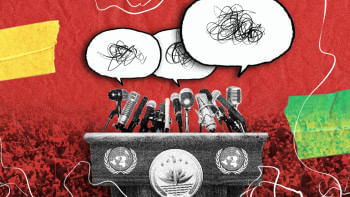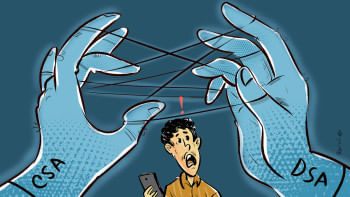Political will key to effective UPR implementation

The Bangladesh government has again taken a protective stance regarding the implementation of the Universal Periodic Review (UPR) recommendations aimed at improving the country's human rights situation. On November 13, the UN Human Rights Council (UNHRC) conducted its fourth review of the implementation status of Bangladesh's obligations to promote, protect and respect human rights within the UPR framework. During this review, 110 UN members provided the government with 301 recommendations. The government's final stance on these recommendations, accepting some and noting others, was documented in the "Outcome Document" adopted on March 25 during the ongoing session of the UNHRC in Geneva.
The government has accepted without comment 210 of the 301 recommendations. However, it accepted one recommendation (on disappearance and torture) with comments, and noted 90 recommendations. "Accepted" indicates that the government will initiate efforts to implement these recommendations and provide progress reports to the UNHRC in the next cycle. "Noted" signifies that the government is presently unable to support these recommendations, but intends to lay the groundwork for acceptance in upcoming reviews.
It is noteworthy that the government has accepted recommendations, among others, to incorporate international human rights law provisions into national legal frameworks, train police to protect human rights defenders, and ensure thorough investigation and prosecution, accountability and appropriate compensation for incidents of human rights violations and torture by members of the security forces. The government has also accepted several recommendations related to freedom of expression and media (including protection of human rights workers), freedom of assembly and association (including the rights of dissidents, civil society representatives, lawyers, and journalists), protection against arbitrary arrest, and proper investigation into allegations of torture, brutality, or misconduct against them. It has accepted recommendations to ensure that human rights workers and journalists can work without fear of censorship or reprisal; ensure a safe and transparent environment for civic organisations, human rights workers, and media workers; and not take any legal action against labour rights defenders and other rights workers for engaging in rights discussions. It has also agreed to adopt policies in line with international obligations for the promotion and protection of freedom of expression and opinion and right to privacy.
In this cycle's UPR, several recommendations were made to strengthen national institutions, which the government accepted. These include, among others, empowering the National Human Rights Commission (NHRC) in light of the Paris Principles and ensuring its independence and effectiveness, and maintaining the independence of the judiciary and keeping it strong. Simultaneously, Bangladesh has supported recommendations related to the swift adoption of anti-discrimination laws, the elimination of all forms of discrimination. and providing appropriate compensation to victims.
The government accepted one recommendation with comments. This was from Italy regarding the prevention of incidents of disappearance and torture. In this regard, the government observed that there is a tendency to portray all "missing" incidents as abductions over time to criticise the government. It has further stated that there is no such term as "enforced disappearance" in Bangladesh's legal framework, and domestic criminal laws include provisions on "abduction or kidnapping" which apply to all individuals, including law enforcement agencies.
The government did not accept recommendations regarding the ratification of the United Nations Convention on the Protection of All Persons from Enforced Disappearances. In this regard, according to the government, reform in legal regimes, improvement of the efficiency of the implementing organisations, and consensus among stakeholders are essential. Bangladesh has mentioned its continued cooperation with the UN Working Group on Enforced or Involuntary Disappearances. Despite presenting these arguments in the last few cycles of the UPR, there have been no initiatives over the years to reform existing laws or arrange dialogues with stakeholders, affected families and survivors. Furthermore, there have been repeated attempts to reject allegations of disappearances outright, and to target those raising these issues, without impartial and independent investigations into the allegations.
The government has not supported the recommendation for the establishment of independent monitoring and investigation mechanisms for allegations of human rights violations by members of the police and military personnel, stating that it believes existing training arrangements adequately emphasise respect for human rights and clear penalties are in place if there is any deviation. The government has further stated that law enforcement agencies are "highly sensitive" to human rights, and in case of any misconduct, disciplinary and departmental actions are taken and criminal charges are made. However, the alignment of this stance with the current human rights situation in the country is questionable, particularly given the numerous allegations of human rights violations against law enforcement agencies, notably allegations of torture and death. Despite a decrease in the number of allegations of extrajudicial killings following sanctions against the Rapid Action Battalion, reports of deaths and torture in police custody persist.
Additionally, although it accepted recommendations related to preventing violence against women and children, the government did not accept recommendations regarding the establishment of a permanent national mechanism for reporting and follow-up on recommendations about human rights, amendment of the special provision of the Child Marriage Prevention Act 2017, implementation of a national comprehensive plan on child protection, legal recognition of marital rape, and withdrawal of reservations to Articles 2 and 16(1)(c) of the Convention on the Elimination of All Forms of Discrimination against Women (CEDAW). Regarding marital rape, the government has stated that marital rape is not recognised in Bangladesh's legal framework, and that no legal changes are deemed appropriate in the current social context. However, there is a rule issued by the High Court in November 2000 asking the government why laws allowing marital rape of women and girls aged above 13 should not be declared null and void, being discriminatory, and in violation of the fundamental rights of married women and girls.
Regarding the withdrawal of the CEDAW reservations, the government's position is that it has undertaken various initiatives to protect women's equal rights but before withdrawing these two articles, it would hold extensive multi-stakeholder consultations to address the differences of opinion within various sections of society, including minority communities.
Furthermore, Bangladesh has noted recommendations regarding the recognition of the rights of indigenous peoples and the ratification of International Labour Organization Convention No. 169, rights of minorities, and the protection of the rights of Dalits, stating that the government believes the Bangladesh Constitution ensures equal rights for all, and in this regard, special recognition or enactment of laws is not necessary.
The government has not accepted the recommendations for the amendment of cyber security legislation, stating that it believes the criticisms of the Digital Security Act (DSA) have been addressed through the adoption of the Cyber Security Act (CSA) which will create a transparent, accountable, and secure digital environment without compromising the freedoms provided in the Constitution. However, serious concerns persist among civil society, journalists, and UN bodies regarding the provisions and implementation of the CSA, as it still contains elements that could curtail freedom of expression and in particular of the press. There are concerns about its arbitrary application and the continuation of cases under the DSA, lack of redress for those including women and young people who faced arbitrary arrest, and deprivation of liberty in relation to its use.
Many of the recommendations from previous cycles of the Universal Periodic Review (2009, 2013, and 2018) have not been implemented satisfactorily by the government. There is a noticeable lack of visible and coordinated planning in this regard, as well as of any inter-ministerial coordination committee or regular dialogue with stakeholders. The absence of awareness among key stakeholders in various ministries regarding the process and recommendations provided in the UPR is evident. Although efforts have been made by the government and the NHRC to establish focal points for the UPR in various ministries, it has not been followed up and has so far not proven to be effective. Despite the organising of several consultation meetings by the Ministry of Foreign Affairs for the third cycle to develop an action plan for proper implementation, there were no substantial results. Similarly, no national consultation or discussion was held on the draft before submitting the fourth cycle's national report. Regarding the recommendations made in the fourth cycle, there was no visible engagement with the NHRC or other stakeholders before the government communicated its final opinion to the United Nations.
The Human Rights Forum Bangladesh (HRFB) stresses the importance of the government's commitment to implementing the recommendations. Instead of rejecting the allegations related to human rights violations, the HRFB urges the government to take appropriate measures through independent, impartial, thorough and effective investigation and appropriate action. Simultaneously, it calls on the government to undertake necessary legislative and policy reforms to address existing challenges, ensure effective implementation of existing laws and policies, and the independence, integrity, and efficiency of relevant institutions.
It is disappointing that the government has only "noted" the recommendation about establishing a permanent national mechanism for reporting and follow-up on recommendations about human rights. Such a mechanism is urgently needed to ensure timely implementation, coordination with various ministries and stakeholders, regular monitoring, transparency in the implementation process, and evidence-based reporting. The HRFB emphasises the urgency of adopting such a mechanism which includes a comprehensive action and monitoring plan for the implementation and coordination of the government's commitments under the UPR mechanism.
This article reflects the views of the members of Human Rights Forum Bangladesh (HRFB).
Tamanna Hoq Riti is coordinator at Ain o Salish Kendra (ASK) and Human Rights Forum Bangladesh (HRFB).
Views expressed in this article are the author's own.
Follow The Daily Star Opinion on Facebook for the latest opinions, commentaries and analyses by experts and professionals. To contribute your article or letter to The Daily Star Opinion, see our guidelines for submission.

 For all latest news, follow The Daily Star's Google News channel.
For all latest news, follow The Daily Star's Google News channel. 











Comments